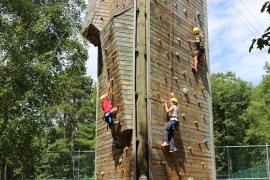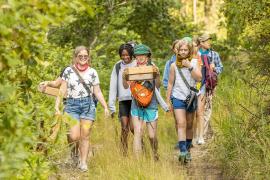The thing about mental, emotional and social health (MESH) is that you never know when, and you never know how, it is going to affect you or someone you love. You don’t know when your best friend or your neighbor may begin to struggle. Or finally tell you they have been for a long time. And you never know when that camper, that you would never admit was your favorite but of course was, will arrive back at camp for her 4th summer and doesn’t quite seem “the same”. But that is the thing about mental illness. It is nowhere and everywhere all at once.
I had such a camper. Katie (yes this is her real name) was willing and eager to answer a few questions about her time at camp, her battle with mental illness and how, with a lot of hard work, she is doing today.
Looking back at your time as a camper, what role did camp play in helping you cope with your mental illness?
Mental illness started becoming a part of my day to day life around the age of 13, I had started going to camp at 10 years old. I knew that even though a large part of my life had become a struggle with my new diagnosis that camp would still be a constant for me, and it was. At camp, I felt safe and accepted by the staff and my fellow campers. I felt I didn’t need to put up a front, that regardless of my state of mind, I would still be loved in the camp community. The camp structure kept me focused on the present and helped relieve my anxiety.
What is something or a couple things that your counselors did to help you with your mental illness while at camp?
A major step the camp staff took to help my mental health while I attended camp was that they never made a big deal about my illness. When I was at camp I just got to be a kid for once. The positive enforcement of my counselors helped me gain more and more confidence in myself. They listened to me and they paid attention. They could tell when I was off or wasn’t doing well.
Now that you are older, what skills do you think you developed at camp that you can use in your adult life?
Camp gave me many of my best life skills that I use every day in adulthood. I developed important leadership skills that I was easily able to transfer to my adult life. I also have the confidence, that despite my struggles, I can still be successful. Camp also gave me confidence to talk about my illness and not be afraid to admit when I need help.
Once you became a counselor, what effect did your mental illness have on your job performance? Positives and negatives.
I believe that my bipolar effected my work positively because I was better able to understand the struggles of my coworkers and campers. Suffering from bipolar could be negative at times and sometimes I know I didn’t do my best work. When I was tired or stressed from normal camp life, it hit me double as hard as the other staff and took longer for my body to rebound.
What tools would you have wanted at your disposal to make things easier on you?
(My camp) already has the most important tool available for campers and counselors. This is the environment that they have created to encourage people to be aware of other’s feelings and to be there as a friend to listen when someone is struggling. One tool that (my camp) could have is a safe place for a person to go for an outlet for an hour or so to decompress or get away from everyone else. The constant contact with other people was hard when I had a bipolar episode. Having a quiet place to go where I could be alone would have been helpful.
If you could go back in time what questions would you have wanted camp to ask you to make your time more successful?
As a camper I think it could have been very positive for there to be questions for my parents about what they believed was the best ways to communicate with me when I was struggling. My parents weren’t always the most forthcoming with information about my illness, and who knows, camp may have asked, but the more they would have talked to my parents about it the better. Even if my parents didn’t want to talk. Director note: Although we did ask, we didn’t do it well enough. This is something we have learned from working with Katie and her family and strive to do much better with now.
If you could give a piece of advice to a camp director about how to work with campers with mental illness, what would it be?
Take time to listen to the camper who is struggling. Pay attention. Looking back at it, I know I gave off lots of signals when I was having a bad day or week. Most of the time people picked up on them, but not always. Kids with known mental illness need a little more TLC then those without.
If you could give a piece of advice to a camp director about how to work with staff with mental illness, what would it be?
f you notice a staff member is struggling, assess how they are feeling, listen and discuss with them what would be best for them and their campers. Don’t be afraid to ask. Chances are they need a break. It is exhausting to have a mental illness. Add that to the camp environment and it can be really draining. Everyone tip toes around mental illness, but at least in my experience, talking is golden. Also, don’t count us out. With the right mentor and proper checks and balances, people with mental illness can make great camp staff and offer a perspective on the world that is different from others.
Katie was a camper for six summers, an intern for one summer and counselor for three summers. Although she continues to struggle with her bipolar disorder, she is receiving regular counseling and recently graduated from Creighton University. She is an advocate for young people struggling with mental illness and was the president of the ActiveMinds chapter at Creighton University. In the future, she hopes to work with youth who are at high risk for mental illness. She is also an Anchor Award winner at Camp Foley.
For additional MESH (Mental, Emotional, and Social Health) resources, check out:
- Camper Behavior Assessment tool for camps
- What Now? Understanding and Supporting Campers with Mental Health
- ACA MESH Healthy Camps Toolbox
Alli Faricy, Director, Camp Foley
[email protected]
www.CampFoley.com
The views and opinions expressed by contributors are their own and do not necessarily reflect the views of the American Camp Association or ACA employees.


